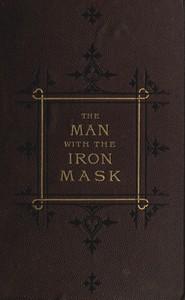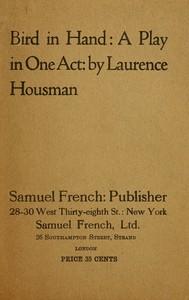|
|
Read this ebook for free! No credit card needed, absolutely nothing to pay.Words: 107435 in 24 pages
This is an ebook sharing website. You can read the uploaded ebooks for free here. No credit cards needed, nothing to pay. If you want to own a digital copy of the ebook, or want to read offline with your favorite ebook-reader, then you can choose to buy and download the ebook.

: The man with the iron mask by Topin Marius Vizetelly Henry Translator - Mattioli Ercole Antonio conte 1640-1703@FreeBooksThu 08 Jun, 2023 "Some months after the death of Mazarin," he says, "an event occurred which has no parallel, and what is no less strange, all the historians have ignored it. There was sent with the greatest secresy to the ch?teau of the Isle Sainte-Marguerite, in the Sea of Provence, an unknown prisoner, above the average height, and of a most handsome and noble countenance. This prisoner, on the journey, wore a mask, the chin-piece of which was furnished with steel springs, which left him free to eat with the mask covering his face. Orders had been given to kill him if he should remove it. He remained in the island till a confidential officer, named Saint-Mars, governor of Pignerol, having been appointed governor of the Bastille in 1690, went to fetch him in the Isle Sainte-Marguerite and conducted him to the Bastille, always masked. The Marquis de Louvois went to see him in this island before his removal, and spoke to him standing, and with a consideration which betokened respect. This unknown individual was taken to the Bastille, where he was lodged as well as he could be in the ch?teau. Nothing that he asked for was refused him. His greatest liking was for linen of an extraordinary fineness and for lace; he played on the guitar. He had the very best of everything, and the governor rarely sat down in his presence. An old doctor of the Bastille, who had often attended this singular man in his illnesses, has stated that he never saw his face, although he had examined his tongue and the rest of his body. He was admirably made, said this doctor; his skin was rather brown: he interested one by the mere tone of his voice, never complaining of his state, and not letting it be understood who he could be. This stranger died in 1703, and was interred during the night in the parish church of Saint-Paul. What redoubles one's astonishment is that at the period when he was sent to the Isle Sainte-Marguerite, there had disappeared from Europe no important personage. This prisoner was without doubt one, since this is what occurred shortly after his arrival in the island:--The governor himself used to place the dishes on the table, and then to withdraw after having locked him in. One day, the prisoner wrote with a knife on a silver plate, and threw the plate out of the window towards a boat which was on the shore, almost at the foot of the tower. A fisherman, to whom the boat belonged, picked up the plate and carried it to the governor. He, astonished, asked the fisherman: 'Have you read what is written on this plate, and has any one seen it in your possession?' 'I do not know how to read,' answered the fisherman; 'I have just found it, and nobody has seen it.' The peasant was detained until the governor had ascertained that he could not read, and that the plate had been seen by nobody. 'Go,' he then said to him, 'you are very lucky not to know how to read!'" What improbabilities, what contradictions, what errors accumulated in a few pages! This unknown, whom no one, not even his doctor, has ever seen unmasked, has his face described as "handsome and noble;" Saint-Mars, named governor of the Bastille in 1690, and traversing the whole of France in order to fetch a prisoner, for whom during eight-and-twenty years another gaoler had sufficed; this mask with steel springs covering day and night the face of the unknown without affecting his health; this resignation which prevented his complaining of his position and which did not allow him to give any one a glimmering as to who he was, and this eagerness to throw out of his window silver plates on which he had written his name; this peculiar taste for fine linen, which Anne of Austria also possessed, and which revealed his origin; this haste on her part to confess her adultery to her enemy, the Cardinal de Richelieu; the Queen of France making only the Prime Minister the confidant of her confinement; and these two events, the birth and the abduction of a royal child, so well concealed that no contemporary memoir makes mention of them: such are the reflections which immediately suggest themselves on reading this story. "Dame P?ronnette, the midwife, brought the Prince up as her own son, and he passed for being the bastard of some great lord of the time. The Cardinal confided him later to the governor to educate him as a King's son, and this governor took him into Burgundy to his own house. The Queen-mother seemed to fear that if the birth of this young Dauphin should be discovered, the malcontents would revolt, because many doctors think that the last-born of twin brothers is really the elder, and therefore King by right. Nevertheless, Anne of Austria could not prevail upon herself to destroy the documents which established this birth. The Prince, at the age of nineteen, became acquainted with this State secret by searching in a casket belonging to his governor, in which he discovered letters from the Queen and the Cardinals de Richelieu and Mazarin. But, in order better to assure himself of his true condition, he asked for portraits of the late and present Kings. The governor replied that what he had were so bad that he was waiting for better ones to be painted, in order to place them in his apartment. The young man proposed to go to Saint-Jean de Luz, where the court was staying, on account of the King's marriage with the Spanish Infanta, and compare himself with his brother. His governor detained him, and no longer quitted his side. "The young Prince was then handsome as Cupid, and Cupid was very useful to him in getting him a portrait of his brother, for a servant with whom he had an intrigue procured him one. The Prince recognized himself, and rushed to his governor, exclaiming, 'This is my brother, and here is what I am!' The governor despatched a messenger to court to ask for fresh instructions. The order came to imprison them both together." If, in this searching examination, we touch upon delicate points--if, in order to destroy the unjust accusations with which the memory of Anne of Austria has been defaced, we penetrate deeply into the details of her private life and that of her royal husband--we are drawn thither by those who, by carrying the debate on to this ground, compel us to follow them. We shall unhesitatingly touch upon each of the memories which they have not feared to recall, and nothing will be omitted that can throw light upon our proof. We shall, nevertheless, strive not to forget what is due to our readers, and the necessity of convincing them will not make us negligent of the obligation we are under of respecting them. FOOTNOTES: London, 1790. It is known that Soulavie used the notes and papers of the Marshal de Richelieu with such bad faith, that the Duke de Fronsac launched an energetic protest against his father's ex-secretary. First Hypothesis--Portrait of Buckingham--Causes of his Visit to France--Ardour with which he was received--His Passion for Anne of Austria--Character of this Princess--Journey to Amiens--Scene in the Garden--The Remembrance that Anne of Austria preserved of it. Giddy with a success which surpassed even his expectations, and dazzled by the splendour which he shed around him, he saw only the Queen of France worthy of his homage, and suddenly conceived for her the most vehement passion. Too frivolous to bury this sentiment in his heart, he displayed it with complacency, and his temerity increased with his ostentation. Anne of Austria was a Spaniard and a coquette. She understood gallantry such as her country-women had learned it from the Moors--that gallantry "which permits men to entertain without criminal intentions tender sentiments for women; which inspires in them fine actions, liberality, and all kinds of virtue." "She did not consider," says one who best knew Anne of Austria, "that the fine talk, which is ordinarily called honest gallantry, where no particular engagement is entered into, could ever be blamable." So she tolerated with indulgence and without astonishment a passion congenial to her recollections of her country and her youth, and which, while flattering her self-esteem, did not at all shock her virtue. She received this homage of vanity with the complacency of coquetry, knowing herself to be most beautiful, most powerful, and most worthy of being loved. On Buckingham's side there was indiscreet persistence, multiplied signs of being in love, and eagerness to be near her; on hers, timid encouragement, gentle sternness, severity and pardon by turns in her looks appeared to Anne of Austria the natural and ordinary incidents of a gallantry where neither her honour nor even her reputation seemed exposed to any peril. Moreover, if numerous festivities gave them frequent opportunities of seeing one another, the court being always present at the many interviews of the Ambassador with the Queen, restrained and embarrassed the enterprising audacity of the one, but entirely justified the confidence of the other. Two days afterwards Henrietta Maria quitted Amiens for Boulogne; Marie de Medicis and Anne of Austria accompanied her to the gates of the town. Anne of Austria was in a carriage with the Princess de Conti. It was there that Buckingham took leave of her. Bending down to bid her adieu, he covered himself with the window-curtain, in order to hide his tears, which fell profusely. The Queen was moved at this display of grief, and the Princess de Conti, "who gracefully rallied her, told her that she could answer to the King for her virtue, but that she would not do as much for her cruelty, as she suspected her eyes of having regarded this lover with some degree of pity." Too passionately enamoured for separation to be able to cure him of his love, and excited still more to see Anne of Austria again by the recollection of his gross rashness, the Duke of Buckingham, whom unfavourable winds detained at Boulogne, returned suddenly to Amiens with Lord Holland, under pretence of having an important letter to deliver to Marie de Medicis, who, owing to a slight illness, had not quitted this town. "Returned again!" said Anne of Austria to Nogent-Bautru, on learning this news; "I thought that we were delivered from him." She had been bled that morning, and was in bed when the two English noblemen entered her chamber. Buckingham, blinded by his passion, threw himself on his knees before the Queen's bed, embracing the coverings with ecstasy, and exhibiting, to the great scandal of the ladies of honour, the impetuous sentiments which agitated him. The Countess de Lannoi wished to force him to rise, telling him, with severity, that such behaviour was not according to French customs. "I am not French," replied the Duke, and he continued, but always in the presence of several witnesses, to eloquently express his tenderness for the Queen. The latter, being very much embarrassed, could not at first say anything; then she complained of such boldness, but without a great deal of indignation; and it is probable that her heart took no part in the reproaches which she addressed to the duke. The next day he departed a second time for Boulogne, and never again saw the Queen of France. Free books android app tbrJar TBR JAR Read Free books online gutenberg More posts by @FreeBooks
: The carriages at Shelburne Museum by Carlisle Lilian Baker - Shelburne Museum; Carriages and carts Exhibits; Carriages and carts History@FreeBooksThu 08 Jun, 2023

: Designs for Crazy Daisy Winder by Hewlett Esther Parnell Hewlett Frank Howard Photographer - Crocheting Patterns@FreeBooksThu 08 Jun, 2023
|
Terms of Use Stock Market News! © gutenberg.org.in2025 All Rights reserved.






